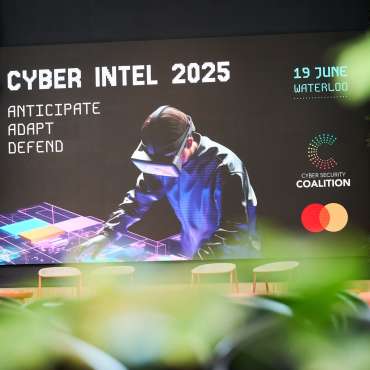Laurie-Anne Bourdain and representativeness in cybersecurity
From risk management to Women4Cyber
Laurie-Anne Bourdain began her career in the banking and consulting sector. Her responsibilities as a functional analyst, then in risk management, and today as DPO, have plunged her into the very heart of cybersecurity.
Not only in risk management, but also in communication, awareness-raising, strategy, planning, etc. In addition to technical responses to threats facing organizations, these new professions address ethical and legislative issues.
In parallel to that and to her mandate as a member of the board of directors of ISC2, an international cybersecurity training and certification association, she co-created the Belgian chapter of Women4Cyber, an association that aims to increase the visibility of women in the cybersecurity sector.
‘Women can bring different skills, sometimes less technical. Be it in the legal, human, practical aspects and in the area of reliability. Women may be afraid of technology, but we need women in all areas, especially in the context of CSR and the Digital Market Act.’
Working in cybersecurity: aiming for a multidisciplinary approach
The cybersecurity sector is still plagued by preconceived ideas and cognitive biases regarding the professions and profiles sought after. It is important to remember that just a few years ago, there was no degree that would prepare you for a career in this field.
As Laurie-Anne Bourdain points out, it is not necessary to have a degree in cybersecurity to embark on this path. The sector needs people with a variety of training or professional experience, in law, ethics, project management, etc.
‘Cybersecurity is not just about fighting hackers. It is about raising awareness, communicating, managing projects, following the legislation.’
In addition, the doors of the cybersecurity sector are open to both men and women because the roles are not determined by gender.
However, it is Laurie-Anne Bourdain’s observation that because of their education and social norms, women are more likely to fill the support positions.
They excel particularly in management, strategy and supervision in risk management.
But there are also women in more technical positions in the pen-test teams or the red and blue teams.
New jobs in cybersecurity definitely require new skills but more important than that are curiosity and a willingness to learn. Possessing these qualities herself, Laurie-Anne Bourdain finds that the most successful people in the sector are those who are interested in all the related fields.
Women4Cyber in Belgium: be aware, be visible and be inspired
As interim chair of the board of directors of the Belgian chapter of Women4Cyber, Laurie-Anne Bourdain focuses her awareness activities on 3 objectives:
- Make women (and men) aware of the representativeness of women in companies and organizations
- Enhance the visibility of women already active in these professions
- Inspire women to engage in cybersecurity
‘My vision of the Women4Cyber organization in Belgium? That it becomes an important player in integration and diversity, that it is seen as a reliable partner for organizations that would like to raise awareness of the representativeness of women.’
Although modest in size, Women4Cyber engages with partners to organize events and develop mentorship to help women develop their skills, find employment and expand their network. The Cyber Security Coalition and Agoria are among the partners that are playing a key role.
As in many other specialized professions, having a qualified network is a recipe for success. This is why one of Laurie-Anne Bourdain’s main activities in developing Women4Cyber projects is to actively seek support in the form of mentors or stakeholders.
Beyond gender: toward inclusive leadership in the ICT Industry
In the ICT sector, each organization regularly publishes reports on the evolution of its representation, including the representativeness of women. However, we still observe in the media the bonuses given to companies in the ICT sector when women are appointed to CEO positions.
‘My goal with Women4Cyber is that when a woman becomes a director, it is a non-event. A woman gets to the top because of her skills. Period.’
According to Laurie-Anne Bourdain, both the education system and our leaders need to promote equality between men and women. She advocates that the world of ICT should reflect society, composed of both women and men. She also calls for better representation of people with impairments, neurodiversity and of different nationalities.
From this perspective of inclusion, she believes that the Cyber Security Coalition has a role to play in engaging with schools to attract future talent and show them the diversity of people working in IT security.
‘At Isabel, I am the only woman on my team, but 50% of the staff are non-Belgian. There are people from various different countries and sectors… Having diversity across the board is a goal. Everyone has their own particularity. Parity would be a reflection of an egalitarian society. This limits bias. Teams with different skill sets work better. This has been demonstrated in studies.’
Laurie-Anne Bourdain’s vision for the future is similar to that of Women4Cyber: in order for the sector to be more inclusive (women, people with impairments, people of various origins and ethnicities, etc.) and to reflect the diversity of our society, wherever possible quotas should be abolished, and actions should demonstrate that everyone has a place. This would make the sector more attractive in a context of talent shortages where skills are required in all disciplines to meet the challenges of the fight against cybercrime.






